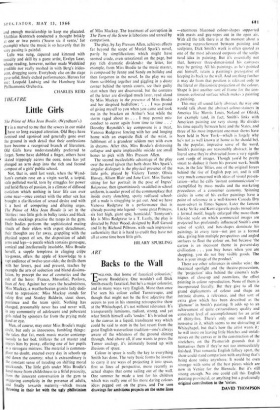THEATRE
Little Girls
The Prime of Miss Jean Brodie. (Wyndham's.)
T is a marvel to me that the sewers in our midst I h a ve so long escaped attention. Old Boys have itemised and agonised and generally gone over the ground in such detail that their confessions have become a recognised branch of literature. Old Girls have understandably preferred to forget. Some have dabbled a finger, others have skated trippingly across the ooze, none has yet plunged an arm deep into the rich and fecund compost of a girls' public school.
Not, that is, until last week, when the Wynd- ham's curtain rose on a virgin world, a torpid, stale polluted world, torn by struggles for power and lurid flares of passion, in a climate of diffused eroticism which nothing in later life can ever come near—once contact with the other sex has brought a clarification of sexual desire and with it a host of competing and diluting urges. The Prime of Miss Jean Brodie is set in the 'thirties: two little girls in bulky tunics and black woollen stockings practise the tango in the gym. Their bodies perform the sophisticated mating rituals of their elders with expert detachment, their thoughts are far away, grappling with the physical aspect of sex, the disposition of adult arms and legs—a puzzle which remains grotesque, comical and intellectually insoluble. Miss Brodie herself, a supple temptress in digging crêpe tea-gowns, offers the apple of knowledge to a rapt audience of twelve-year-olds; she thrills them with her lovers, past and present, teaches by example the arts of seduction and bland dissimu- lation, by precept the use of cosmetics and the cult of the hero : Franco, Mussolini, Pavlova, Joan of Arc. Against her rears the headmistress, Miss Mackay, a weatherbeaten granite lady dedi- cated to repression : Miss Mackay stands for safety first and Stanley Baldwin, stout shoes, prurience and the team spirit. Nothing has changed, presumably never has and never will, in any community of adolescent and pubescent girls ruled by spinsters far from the prying male hand or eye.
Men, of course, may enter Miss Brodie's magic circle, but only as innocuous, fumbling things: she takes that fat, meek music master contemp- tuously to her bed, titillates the art master and enjoys him by proxy, offering one of her pupils as a surrogate mistress. The material is common- place no doubt, enacted every day in schools up and down the country; what is extraordinary is the constant sense of treading on shifting moral quicksands. The little girls under Miss Brodie's hand move from childishness to a fitful precocity, from the innocent conversation in the gym to sniggering complicity in the presence of adults, and finally towards maturity—which means throwing in their lot with the ugly philistinism
of Miss Mackay. The treatment of corruption in The Turn of the Screw is laborious and unreal by comparison.
The play, by Jay Presson Allen, achieves effects far beyond the scope of Muriel Spark's novel, partly by simplifications which might have seemed crude, even sensational on the page, but pay rich dramatic dividends: the letter, for example, from Miss Brodie to the music master, is composed by Jenny and Sandy on holiday and then forgotten in the novel. In the play we see them scribbling together and giggling in a dusty corner behind the tennis courts, see their guilty start when they are discovered, but the contents of the letter are divulged much later, read aloud by Miss Mackay in the presence of Miss Brodie and her despised bedfellow : `. . . I was proud of giving myself to you when you came and took me in the bracken on Arthur's Seat while the storm raged about us . . . I may permit mis- conduct to occur again from time to time . . Dorothy Reynolds's icy composure is a treat, Vanessa Redgrave fencing with her and lunging home with an exquisite flick of the wrist, is fulfilment of a grandeur seldom met with even in dreams. After this, Miss Brodie's distressing collapse and quite implausible suicide are small bones to pick with Mrs Presson Allen.
The second incalculable advantage of the play over the novel (given that both share Mrs Spark's singular dialogue) is the physical presence of the little girls, played by Vickery Turner, Olivia Hussey, Alison Blair and Jane Carr. Miss Turner sitting for her portrait in the pose of Ingres' Baigneuse, then ignominiously swaddled in school uniform, is ocular proof of the commonplace that inside every slouching, spotty redfaced school- girl a nude is struggling to get out. And we have Vanessa Redgrave in a performance that is already passing into legend—`some great Princess, six feet high, giant epic, homicidal.' Tennyson's Ida is Miss Redgrave to a T. Lastly, the play is directed by Peter Wood, designed by Rolf Gerard and lit by Richard Pilbrow, with such impressive authenticity that it is hard to credit they have not all at some time been little girls.
HILARY SPURLING


































 Previous page
Previous page